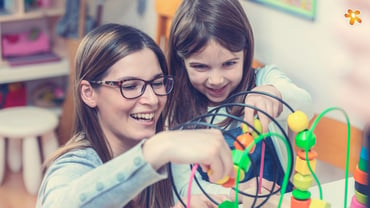What IS Social Skills Instruction?
Speech-Language Pathologists, Occupational Therapists and Behavioral Therapists! These professionals are now learning and being trained more on a deeper level when it comes to social skills. The focus now is on helping children build a better awareness of their own thoughts and the thoughts of others. Professionals are now teaching children how social expectations change depending on context and are providing opportunities to learn, observe and practice these skills with others in a safe environment.
When it comes to social skills instruction, it’s less about conversational rules to follow or common courtesies to use and more about being aware of social clues that people give us to help us navigate social interactions. What’s appropriate in one setting can be inappropriate in another. Some children need support in learning that people don’t always mean what they say and often don’t say what they mean. Once you start to think about it as a parent, you may easily become overwhelmed with trying to figure out how to help your child understand all the implied meanings and nuances that are involved when socializing with others.
Top 5 concepts to look for when choosing a program or therapy approach for your child
If your child struggles socially, it can be difficult to find the right therapy program or social skills group for your child. Whether it’s in a social group or individual social skills therapy, here are five of the most important concepts that should be included and addressed:
- Metacognition and Thinking About Thinking
- Perspective Taking and Theory of Mind
- Social Expectations and How they Vary by Context
- Non-Verbal Language and How It Impacts Meaning (Tone of Voice, Body Language)
- Critical Thinking Skills (Inferencing, Problem Solving, Predicting, Indirect Language)
Being more aware of these concepts will hopefully help you as a parent when selecting the right program or social group for your child. Make sure the program or approach includes some or all of these concepts in order to make sure your child is getting the most updated approach. Speech-Language Pathologists, Occupational Therapists and Behavioral Therapists are all trained to evaluate and treat children with social language deficits.
If you feel your child may need some additional support, locate a therapist in your area to determine if services are needed to help your child develop and strengthen social skills. Carolina Pediatric Therapy is very excited to be starting their very own social skills group this year in 2018! For more information about this program, click here.
What IS Social Skills Instruction?
Catherine Tintle, M. Ed. CCC-SLP
Catherine Tintle is a speech-language pathologist who is passionate about helping children develop and refine social skills, executive functions, and expressive language. She works for Carolina Pediatric Therapy and is an avid blogger and creator of speech therapy materials. Find out more about her on her website, www.TheCreativeSLP.com.
Sources: Scaling of Theory of Mind Tasks Social Thinking Curriculum
Want to know how a Therapist can Help?
Call (828) 398 0043 or click on the schedule button.



